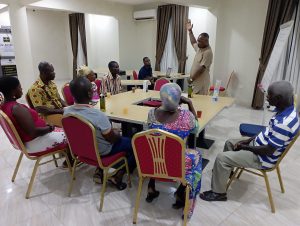Fifteen (15) selected members from 6 communities that will be directly impacted by the Ewoyaa Lithium Project have been taken on a four-day learning and experience sharing visit to Tarkwa by Friends of the Nation. The visit was to provide the avenue for the members to appreciate company-community relations, grievance mechanisms, business, human rights, and gender policies of mining firms in Tarkwa, and the role of local assemblies and the Environmental Protection Agency in protecting community rights and safeguarding the environment. Also, it was to provide insight into benefits sharing of mineral royalties through the Minerals Development Fund, resettlement and compensation and corporate social investments by mining companies.
The community members were from Ewoyaa, Krofu Kaampakrom and Ansaaze in the Mfantseman municipality of the Central Region in whose areas some 35.3Mt of lithium has been discovered.

They visited Tarkwa Municipal Assembly, the Environmental Protection Agency in Tarkwa, Anglogold Ashanti Iduaprim Mine, (Sustainability Department) Goldfields Ghana Limited-Tarkwa, Adieyie community (Mile 8) and interacted with Traditional leaders in Prestea. Ghana has discovered in commercial quantities lithium deposits in Ewoyaa and adjourning communities led by Atlantic Lithium which is projected to have12.5 years life of mine at current estimates.

Lithium is used in the production of batteries to power electric vehicles and other electronic devices such as smartphones etc. and is considered a green source of energy to power the transition from fossil fuels to cleaner energy.
Interactions with the Tarkwa Nsuaem Municipal Assembly

At the Tarkwa Nsuaem Municipal Assembly, the visiting community members were taken through the impact of mining on the economy of Tarkwa by the Development Planning unit of the assembly, especially employment opportunities. They were also taken through the impact of allocations to the assembly from the Mineral Development Fund and how this has spurred development in the municipality.

The negative impacts of mining such as high expectations of residents, high cost of living, shift in traditional occupation of residents, conflict between mining company and catchment communities, as well as unacceptable social vices were also discussed.
At the Tarkwa Environmental Protection Agency

Community members also visited the Tarkwa office of the EPA. The team briefed them on the role of the EPA in environmental governance and how mining communities collaborate the efforts of the agency to co-manage the environment.
Discussions were also held on the processes for carrying out crop and land compensations, as well as resettlement of communities and how laxity on the part of one stakeholder could lead to regrettable consequences.
At Anglogold Ashanti Iduaprim Mine-Tarkwa

The visiting team also interacted with the Sustainability Department of the Anglogold Ashanti Iduaprim Mine. The company explained how communities and mining companies could live side by side. They spoke of Anglogold Ashanti’s grievance mechanisms, employment agreement with catchment communities, corporate social investment, and processes it followed in recently resettling the New Cape Town community in Tarkwa.


The team then visited the resettled community of Cape Town in Tarkwa. This is the new houses built to accommodate resettled residents by Anglogold Ashanti in Tarkwa. Not all the houses are completed and development is still ongoing.



At Goldfields Ghana Limited-Tarkwa
Goldfields Ghana Limited’s sustainability team met with the visiting community members. Their presentation discussed their crop and land compensation principles, grievance mechanisms, gender policy and corporate social investments. The team stressed why it is important for mining companies to inform every would-be affected community member of its exploratory and production activity ahead of time before lines of exploration are constructed through farmlands.



At Mile 8 (Adieyie Community)
At Adieyie Community (also called Mile 8), the visiting members met with the chief of the community and his elders, the assembly member for the Teberebie Electoral Area, the leadership of youth group in the catchment community and some community members.

They were taken through land and crop compensations issues and how they’ve been able to sort out that with the mining companies. They also explained employment codes and procedures signed with mining companies as well as corporate social investment strategies. Some Corporate Social Investments by Anglogold Ashanti Iduaprim Mine was also visited.



Time with Nana Nteboah Prah IV, divisional chief of the Prestea Himan Traditional Area.

Nana Nteboah Prah IV, divisional chief of the Prestea Himan Traditional Area took the team through traditional issues that often arise by the discovery of minerals in an area. He assisted the team to identify traditional issues that often arise and shared solutions that have worked in other traditional settings. He stressed on recognition of each other’s rights, role and equity in working in unison.

